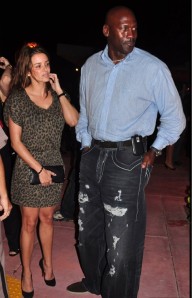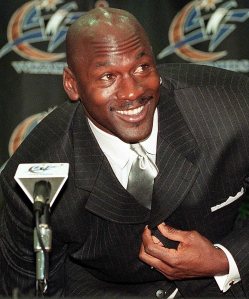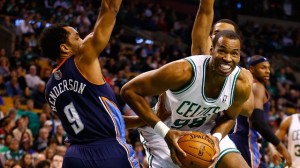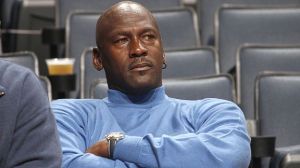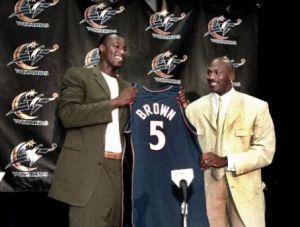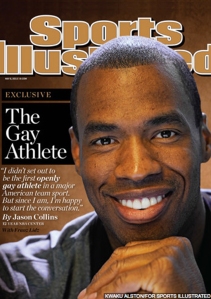
The first pick on Pete Rozelle's watch as NFL Commissioner was the legendary
Billy Cannon.
The first pick of Paul Tagliabue's stint was Jeff George.
The first first pick announced by Roger Goodell was
Jamarcus Russell.
That trajectory is what learned men might call portentous.
Widely considered one of the biggest #1 pick busts in NFL history, Jamarcus Russell signed a 6 year $68 million deal in 2007 to resurrect Al Davis' slumping Oakland Raiders.
But the fact is, the kid never really had a chance.
Here's a refresher on the situation he was drafted into: The Raiders were coming off a 2-14 season, with 3 shutout losses, 8 games without a touchdown, and ending on a 9 game losing streak.
This was (and unfortunately, still is) a team adrift. Its obvious that losing that Super Bowl to Tampa Bay in 2003 was devastating, but has anyone ever seen an entire organizational collapse of this magnitude? Consider this: In January 2003, the Oakland Raiders had the highest all-time winning percentage of any professional sports team. In the years since, they have the worst. Of all-time.
Even that sentence feels insufficient to explain just how bad it's been.
| Oakland Raiders |
.591 |
1960-2002 |
| New York Yankees |
.568 |
All-time MLB best |
| Chicago Bears |
.578 |
All-time NFL best |
| Los Angeles Lakers |
.619 |
All-time best win % |
|
|
|
| Oakland Raiders |
.306 |
2003-12 |
| Charlotte Bobcats |
.346 |
All-time NBA worst |
| Los Angeles Clippers |
.375 |
Long-time NBA worst |
| Tampa Bay Lightning |
.384 |
All-time NHL worst |
| Tampa Bay Buccaneers |
.396 |
All-time NFL worst |
| Tampa Bay Devil Rays |
.460 |
All-time MLB worst |
It's not even close.
(Side note: Tampa is one terrible NBA team away from the cycle!
Adam Silver, this needs to be your first order of business.)
All of this cannot be laid at the feet of Jamarcus Russell. This level of rot must stem from the top.
Starting NFL quarterback is the most watched position in sports, and any time a quarterback is drafted #1 overall there is a feeling that he's got to come in and turn things around. Fast. But there are two kinds of teams that land the #1 pick in the NFL: 1) Terrible teams in need of a QB, and 2) terrible teams in need of just about everything. Andrew Luck landed on the former, Jamarcus Russell, the latter.
Consider, since 2003, the Raiders have only had 1 offensive player voted to the Pro Bowl (Zach Miller in 2010-11, also a 2007 draftee, who promptly ran off to join
The Pete Carroll Experience).
No matter how good a QB is, he can't win games by himself.

Just before halftime of a game in Jacksonville in December 2007, Raiders defensive tackle
Warren Sapp got into a shouting match with the officials, got flagged for 3 consecutive unsportsmanlike conduct penalties and was ejected. And just as Sapp had made his final mark on the league (he would only play one more game before retiring), Jamarcus emerged from the halftime break ready to make his first. And make it he did. A black mark. 3 INTs. This too, portentous.
You all know what happened next.
18 TDs & 23 INTs. 7 wins, 18 losses. Yada yada yada.
It wasn't pretty, and the less said about it the better. Moving on.
December 13, 2009. The Raiders were at home against Washington, coming off a win in Pittsburgh with Bruce Gradkowski at the helm. Jamarcus has been benched a few weeks earlier and the Grad-man had won two of his first 3 starts since getting the nod. With the team down 13-10, the ball deep in their own end and about 15 seconds left in the first half, Gradkowski dropped back to pass. Seeing no one open he tried to move up in the pocket, but he was grabbed from behind and dragged down awkwardly. The medical staff is summoned as a hush falls over Oakland-Alameda Coliseum. Oh no.
When the Raiders offense took the field for the second half, Jamarcus Russell took the field with them and the hush before halftime transformed into a deafening hail of boos. I've heard visiting players and refs and calls get booed before, I've heard owners and commissioners get booed, but never anything like this for a guy from the home team. The first incomplete pass he fired was met with even more boos. For an incomplete pass, not an interception, not a sack, not a fumble. Just a run of the mill incompletion. It was over. Russell wouldn't start again for the Raiders (though he did appear twice more in relief for an injury-prone Charlie Frye), but it was clear he didn't have what it takes, and, more damningly, it was clear the rift between him and the fans was irreparable. I don't know that anyone in the history of sports has ever been more mercilessly booed by home fans than Jamarcus Russell on that day in December.
Russell was cut by the Raiders in the offseason and hasn't been seen on an NFL field since. In an act of knife-twisting irony, he was replaced by the opposing QB from that game against Washington, Jason Campbell. (And Campbell was actually quite good, leading the team to 12-5 record in his starts before he was injured, then inexplicably demoted and eventually dismissed for [old] Carson Palmer in a Hue Jackson-engineered panic, but that's a whole other story). Jamarcus Russell had become the ultimate object of derision, the signpost of all that was wrong with overpaid athletes and the NFLPA's collective bargaining agreement and the hip-hop generation and every other sports and social malady.
In his time in Oakland, Russell played under Lane Kiffin, who never wanted him, and Tom Cable, who never liked him (When Cable's contract was not renewed after the 2011 season, he, too, signed on for The Pete Carroll Experience). Having the support of your coaches is crucial for a young player, even more than having the support of the fans. Without it, you can't develop confidence in your own abilities nor gain the respect of your teammates. If your teammates don't believe in you, you never develop the kind of chemistry necessary for success. And then you lose. And lose. And lose. But again, this comes from the top. Al Davis forced Kiffin to play Russell when the coach knew he wasn't ready. Davis never trusted his coaches evaluations over his own (with the possible exception of John Madden) and as a result the team foundered, Russell struggled and fewer and fewer fans bothered to show up. Pride was Al Davis' stock in trade, the thing that led him to be a successful coach and owner, helped him lead the way in integrating pro football,
led him to steal controlling interest in the team, and it was ultimately his fatal flaw, the thing that led to his downfall as an owner as he watched his team wallow in misery for the last decade. Because he always knew better than anyone else, his mistakes went unchecked and as time went on his mistakes piled up and the team paid dearly as a result.
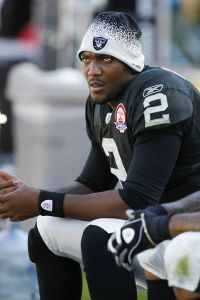
Anyone who watched the Raiders in the Jamarcus Russell era would be all too familiar with the sight of Russell slinking off the field after yet another 3 and out, sitting alone on the bench wearing a black beanie. Most QBs come off and talk to coaches, talk to their linemen, pick up that sideline red phone and call upstairs and look at pictures; not Russell. He would take a seat and that was that. You can put that on him if you like, but somewhere there has to be a leader on the team or on the coaching staff telling him that that isn't the way a pro does it. And staying after him until he cleaned up his act. Maybe that's coddling, but so what? If you're investing $68 million why wouldn't you do everything you can to help him succeed? Would you rather just watch him flail and fail and do nothing but point fingers as you all ride down on a sinking ship?
Jamarcus gets a lot of the blame for his brief period of miserable-ness, but it hasn't gotten any better since he left. Prior to this past April, the Raiders hadn't drafted a single QB since Russell in 2007, which might be defensible had they found "the guy" through free agency or trade but they didn’t (and even if they had it wouldn’t be a good strategy; in the Tom Brady era alone the Patriots have drafted Rohan Davey, Matt Cassel, Kliff Kingsbury, Kevin O'Connell, Zac Robinson, and Ryan Mallett at QB.).
Here's the W-L record of every Raider QB since the start of Russell's rookie year:
| Josh McCown |
2-7 |
| Daunte Culpepper |
3-4 |
| Jamarcus Russell |
7-18 |
| Andrew Walter |
2-7 |
| Bruce Gradkowski |
3-5 |
| Charlie Frye |
1-2 |
| Jason Campbell |
12-5 |
| Kyle Boller |
0-1 |
| Carson Palmer |
8-16 |
| Terrelle Pryor |
0-1 |
Embarrassing. Yet not one member on that woeful brood is persona non grata in Oakland other than Russell. They've got yet another new QB in this year, and Raider Nation remains hopeful that maybe they've finally got their guy and hopeful they can get this thing turned around by the time the next commissioner announces his first pick.
I don't know that Jamarcus Russell would've done better on a different team in a different situation where he could've sat for a year and watched; maybe he really was as bad as he played and no amount of coaching or training or camaraderie could've coaxed more out of him.
I don't know that any other quarterback in the 2007 draft class could've done a better job in his place for the Raiders. Not one of them is starting for an NFL team today, most are not even on NFL rosters. (Brady Quinn, Tyler Thigpen, Drew Stanton, Isaiah Stanback, Troy Smith, Jordan Palmer, Jeff Rowe, Trent Edwards, John Beck, Kevin Kolb...yikes).
I don’t know that any non-QB in that draft could’ve done something to turn things around. I was hoping the team would take Joe Thomas, who’s turned out to be an All-Pro offensive lineman. Calvin Johnson was right there too. (Even though I didn’t think it would’ve made sense to draft a wide receiver without a real quarterback to throw him the ball,
seeing Megatron at Georgia Tech destroying fools while hauling in every pitiful pass from Reggie Ball, I was convinced there was nothing he couldn’t do, and his pro career to date has done nothing to change my opinion on him.)
I do know this: Even though Jamarcus Russell had a chance, he never had a chance.
